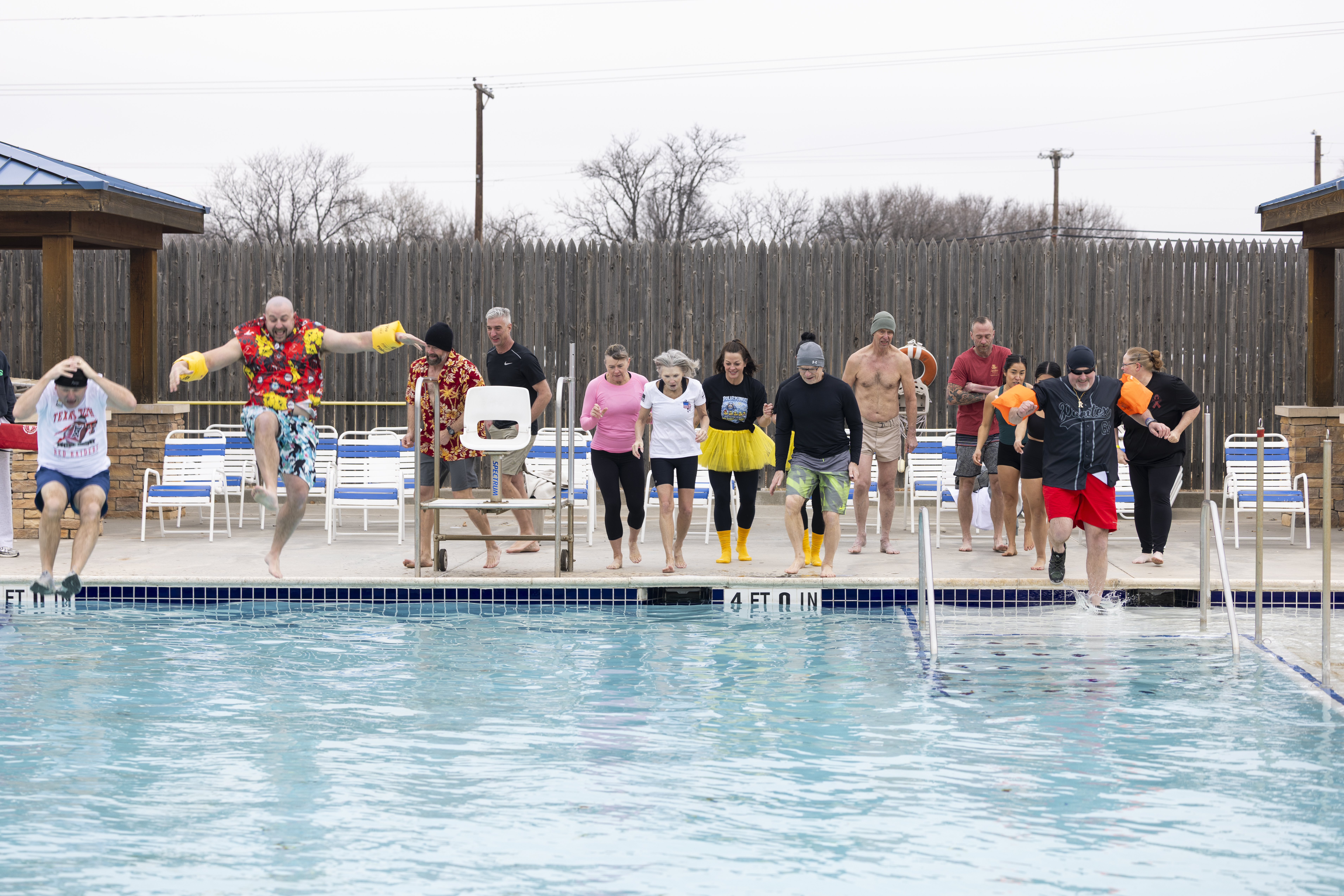Pantex Blog
SLERG makes a splash for community

A group of Pantexans jumps into freezing water in 24-degree weather in support of the Amarillo Polar Plunge.
At 24 degrees, the Amarillo Town Club pool looked less like a place for laps and more like a dare. On the coldest day of the year, a group of Servant Leadership Employee Resource Group (SLERG) volunteers didn’t hesitate—charging straight into the icy water for the Amarillo Polar Plunge, all in support of Special Olympics Texas. This bold undertaking not only marked SLERG's official launch but also perfectly encapsulates the core principles of servant leadership that the group champions.
"It's about demonstrating stewardship not just of our resources but of collective humanity," Quality Senior Director and SLERG President Brad Reeves expressed. “The goal is to make a difference beyond our immediate work.”
Proceeds from the Polar Plunge contribute to year-round sports training, health and inclusion programs, and competitions for local Special Olympics Texas athletes. While the Amarillo Police Department participants have historically dominated Polar Plunges, Pantex and the Pantex Field Office (PFO) provided stiff competition this year and are hopeful to compete for the largest supporter role in 2027.
This event raised over $10,500 for Special Olympics Texas. The Amarillo Polar Plunge awarded Pantex the “Highest Fundraising Team” and Quality Assurance Division Director Kenny Steward was recognized as the overall “Top Individual Fundraiser.”
“I knew Pantex and PFO could, and would, step up to lead the way and, as expected, they dove in,” Nuclear Explosive Safety Analyst and Polar Plunge Team Captain Tom Ellis said. “Pantex put some skin in the game by putting some skin in some pretty cold water.”
For SLERG, a dedicated group comprised of Pantexans passionate about developing humble, bold, and inclusive leaders, the Polar Plunge is more than just a chilly dip; it's a demonstration of their commitment to empower individuals and serve the broader community.
This event exemplifies SLERG's dedication to the growth of Pantexans, fostering resilience and camaraderie among Pantex employees who volunteer for the organization. It also showcases the group’s stewardship and commitment to community involvement, extending Pantex's values to broader engagement.
The "cold shock response" experienced during a Polar Plunge, with its rush of adrenaline and endorphins, creates an exhilarating and memorable experience. For SLERG members, this shared challenge will undoubtedly forge strong connections, offering a unique avenue for team building and skill development.
As SLERG embarks on its journey to empower Pantex employees and foster a more positive and inclusive culture, their participation in the Polar Plunge for Special Olympics serves as a powerful testament to their commitment to servant leadership. SLERG’s contribution vividly illustrates that true leadership begins with service and that by serving others we can all achieve more, creating a ripple effect of positive change.
The flow must go on
Firefighters test hydrants annually to verify operational conditions and document flow rate.
Have you ever turned on the faucet and water didn’t come out? While alarming, the cause can usually be chalked up to a water main break or a faulty valve in the line — which can sometimes be fixed in a matter of hours. Hours may not seem like a long time, but when the Pantex Fire Department (PXFD) needs water, they need it now. That’s why firefighters annually perform operational condition testing on hydrants across the site to proactively verify water flow and hydrant operability.
“This consistent verification helps prevent potential safety oversights that could arise from aging infrastructure,” PXFD Captain Matt Ketelhut said. “It allows us to verify water availability, identify obstructions, and assess system changes.”
Firefighters measure the flow rate in gallons per minute available from each hydrant. This data confirms that sufficient water volume and pressure are accessible for fire suppression. Flow tests can identify problems leading to proactive maintenance or repair. Construction or other modifications to the water distribution system can also impact hydrant performance. Annual testing helps to detect any negative effects these changes might have on water flow.
“Regular testing identifies issues such as clogged mains, corroded valves, or other defects in the water distribution system before a fire occurs,” Ketelhut said. “Addressing these problems proactively prevents potential failures of the water supply when it is most needed, which could otherwise compromise firefighting efforts.”
Pantex has domestic hydrants and High-Pressure Fire Loop (HPFL) hydrants. There are around 268 hydrants on plant site with many more being added when the High Explosive Science and Engineering Facility is finished.
“It takes the entire shift to complete the flows,” Ketelhut said. “Each engine company has a list of hydrants with multiple on each list. We must also test underground valves for the HPFL before we get to test the actual fire hydrants.”
The data collected from testing both systems leads to enhanced pre-incident planning. Firefighters know where to connect hose lines and how much water they can expect, allowing for more efficient and effective deployment of resources during an emergency. This reduces response times and enhances PXFD’s ability to contain incidents before they escalate.
“Accurate hydrant performance data is crucial for facility hazard assessments and the development of emergency preparedness plans,” Ketelhut said. “It allows safety managers to evaluate the effectiveness of the water supply against the specific fire risks present in different areas of the plant, ensuring protective measures are appropriately matched to the hazards.”
By verifying the availability of sufficient water pressure and flow, PXFD can be confident that they have the necessary resources to quickly extinguish fires. This minimizes the spread of fire, reduces damage to facilities, and protects personnel. Fire hydrant testing also ensures Pantex is compliant with inspection standards and flushing requirements.
While PXFD performs the hydrant testing, many other organizations are involved in the process including Fire Protection Engineering, Utilities, Security, the Operations Center, Emergency Services Dispatch Center, Special Mechanic Inspectors, Environmental, Waste Operations and more.
These tests align with the National Fire Protection Association standards such as NFPA 25, which is the benchmark for inspection, testing, and maintenance of water-based fire protection systems. The forward-thinking work our first responders do is best described by paraphrasing the famous quote attributed to Benjamin Franklin: an ounce of prevention is worth a gallon of water…or something like that.
Pantex Proud: Courtney Waddell

Many factors make Pantex a success — things like high-tech tools, technical expertise, and employees with a Texas-sized work ethic. But ask Courtney Waddell, and she’ll tell you the real pride of Pantex can be boiled down to one word: people.
“Without a doubt, it's the people! I couldn't have asked for a better group to work with, and I value the positive environment,” Waddell said. “Despite the many challenges our department faces, they consistently find ways to keep the mood light and have fun.”
Waddell’s people-first focus is apparent to those around her. Her supervisor, Ryan Turner, said Waddell’s demeaner and approach are a model for others.
“Courtney sets the standard for what I envision when I think of a true Pantexan,” Turner said. “She cares deeply about the people and mission, and demonstrates her dedication to both every day. She takes an active interest in those around her and is able to connect and positively impact her coworkers. She demonstrates all the qualities of a servant leader who goes above and beyond to take care of her employees and asks nothing in return.”
To Waddell, the people and their work are simply inseparable, two parts that make up the whole of one’s contributions to Pantex.
“Your work is a direct reflection of you,” she said. “Our work here is important, and although we are not perfect, how we handle our business matters. To me, pride in the workplace means putting your best foot forward in all facets of our business.”
What interested you in a Pantex career?
I was born and raised in the Canyon/Amarillo area. My best subject in school was always math, and I have my parents to thank for pushing me toward an education.
Why is giving back to the community important?
I have found a real passion for serving others. Through various community-service opportunities, I have seen firsthand both the challenges our community faces and the amazing dedication of organizations and people working to solve them. Being from this area and raising a family here, I feel a responsibility to contribute to the community.
Why is being open to learning from others critical?
Being open to learning from others promotes collaboration, helps us solve problems better, and keeps things moving forward with new ways of accomplishing work efficiently and effectively. Sharing what we've learned, whether it's about what went well or challenges we faced, prevents us from making the same mistakes and gives us a good head start when tackling new issues.
Why is communication important for your team to succeed?
Communication is the number one thing needed to be successful at Pantex. Our processes are complicated and require a lot of communication across various organizations, internal and external.
Pantex Proud: Tiffany Wiley

Tiffany Wiley. Photo by Adam Baker
Thousands of dedicated Pantex citizens like Tiffany Wiley work every day to support the Pantex mission. Take three minutes to learn about who she is, what she does, and why she is proud to be a Pantexan.
Tiffany Wiley had what many college students want to secure before they graduate: a job. A geophysics major, Wiley moved from Colorado to the Texas Panhandle in the pursuit of continuing her education and to take a job in oil and gas. Unfortunately, it was not a good time for the industry, so her would–be employer rescinded the offer. Fortunately, business was booming at a little old bomb plant off Highway 60.
“When I moved to the area, I immediately heard about Pantex and how prestigious it was. I never thought I'd be able to work here but thought I'd apply anyway. And the mission sounded super cool! Some time later, I received an offer. The Systems Engineering group gave me a chance and I never looked back.”
Wiley learned coding in college and during her time in Engineering sharpened those skills, noticing along the way how much she enjoyed web development. Several college courses later, she decided to take her abilities to Mission Systems within Information Technology.
“It was exactly what I was looking for, and I have loved it ever since. The group that I work with has been so welcoming to a newcomer outside of IT. We're lucky to have some very smart and experienced people to learn from. Everyone works hard and will go above and beyond to make sure every task is completed and done the correct way. It also doesn't hurt that they all have a great sense of humor.”
Pantex has provided Wiley with a career, and as she immersed herself in the site's culture, she found a sense of accomplishment.
“Now I know why Pantex has such an incredible reputation. Everyone's job has purpose and meaning and I'm proud to do what I do alongside these people. My proudest moment was when I was asked to lead my own team. I only started in this position about 2 years ago. In that short time, I've been able to learn and grow so much with the amazing support of my peers and managers. Now they trust me to take on the next group and help them the same way.”
How do you and your team contribute to mission success?
Many of the apps that we rely on every day to complete the mission are applications Mission Systems either helped develop or currently support – whether it's the Emergency Management Information System or the Dose Records Information System. I'm proud to do what I do alongside the people I get to do it with.
Why is pride in the workplace and the work you do important?
Pride in the workplace is important because if what you're doing means lot to you, it turns work into a passion. For all of us Pantexans, that's incredibly important because what we do is imperative for our nation's safety and security.
Who in your life has inspired you the most? Why?
My husband, Garret. He has this incredible attitude – almost always positive, able to find that silver lining. For those rare moments when he's down, he's quick to snap out of it and come back, working even harder. He also has an amazing open mind and is always willing to listen to others and learn from them where he can. He's not so stubborn to see that maybe he was wrong or someone's ideas are better. He is so kind to his friends and family and always wants to help. He sees the good and just wants to lift up those around him.
Friendly skies: Pantex advancing drone program
Members of Reliability Engineering completed drone flights over the construction site for the Environmental Sampling Facility. Photo by Michael Schumacher.
When you think of an aviation program, you might envision planes, jets, or other large aircraft. But as technology grows larger, useful gadgets get smaller. That's why Pantex's aviation program consists solely of Unmanned Aircraft Systems (UAS), commonly known as drones.
“We've been flying drones at Pantex since 2021,” Aviation Safety Officer Joshua Herm said. “Our goal right now is bringing the program out of its infancy to make it more robust. Currently, we have been able to use drones for photos and videos, inspections, 3D mapping, counter–UAS activity, and live streaming video to increase situational awareness.”
The aviation program was developed and refined to meet mission needs by experts in Safeguards, Security, and Emergency Services (SS&ES) and is run though the Operations Center in Emergency Management. Herm ensures the requirements and responsibilities of the program are met and manages the day–to–day demands of the job. His background positions Pantex to transform the aviation program to a project of the future.
“I spent over 23 years in the Marine Corps, and over half of that time I was a CH–53E Super Stallion helicopter pilot,” Herm said. “My background allows Pantex to have a professional aviator in the role of Aviation Safety Officer, with knowledge and experience of actual aviation operations as well as familiarity with Federal Aviation Administration rules and regulations.”
When Pantexans want to conduct a drone or manned aircraft flight, or even just have an aviation–related question, Herm is the person to contact. He works with the team in SS&ES on the Digital Transformation Initiative, which helps to identify new and emerging technologies and advance Pantex's capabilities in part through the acquisition of new drone and other unmanned systems. Herm's knowledge is valuable as Pantex sets a solid foundation for how future flight operations are conducted.
“The use of drone aircraft and contracted manned flights can be a great asset to other divisions and departments by acting as a force multiplier and tool that allows those organizations to effectively complete an assigned task in a more efficient manner,” Herm said. “This can range from inspections that need to be completed in difficult–to–access areas by Infrastructure, assessing work done for Safety, emergency response by Emergency Management, and even getting much–needed imagery or video for business communications.”
Herm is in charge of more than just overseeing drone flights. He receives flight requests, reviews documents for conflicts with other departments, and evaluates requests for safety to determine if they will cause a flight issue or disruption to any Pantex operations. He also works with NNSA and the FAA to determine if there are issues with the airspace and flight operations, and coordinates with other departments around Pantex as well as external agencies.
Emergency Services offers a training course for any Pantex employee interested in becoming a new drone pilot at the Plant. The training is held a few times each year to build a sufficient cadre of operators. New UAS operators are necessary to facilitate the growing number of flights requested and the equally necessary culture change needed across the Plant, in what Herm sees as a future sky filled with drones.
“I would like to see drone operations at Pantex become a daily event — Emergency Management drones being used when the ERO is activated to increase situational awareness or to locate and identify emergent issues within a short timeframe, as well as every department that thinks they could use a drone to their benefit to increase their capabilities,” Herm said. “I truly think that drones have the ability to assist us in many ways, and I would like to see those ideas become a reality.”
